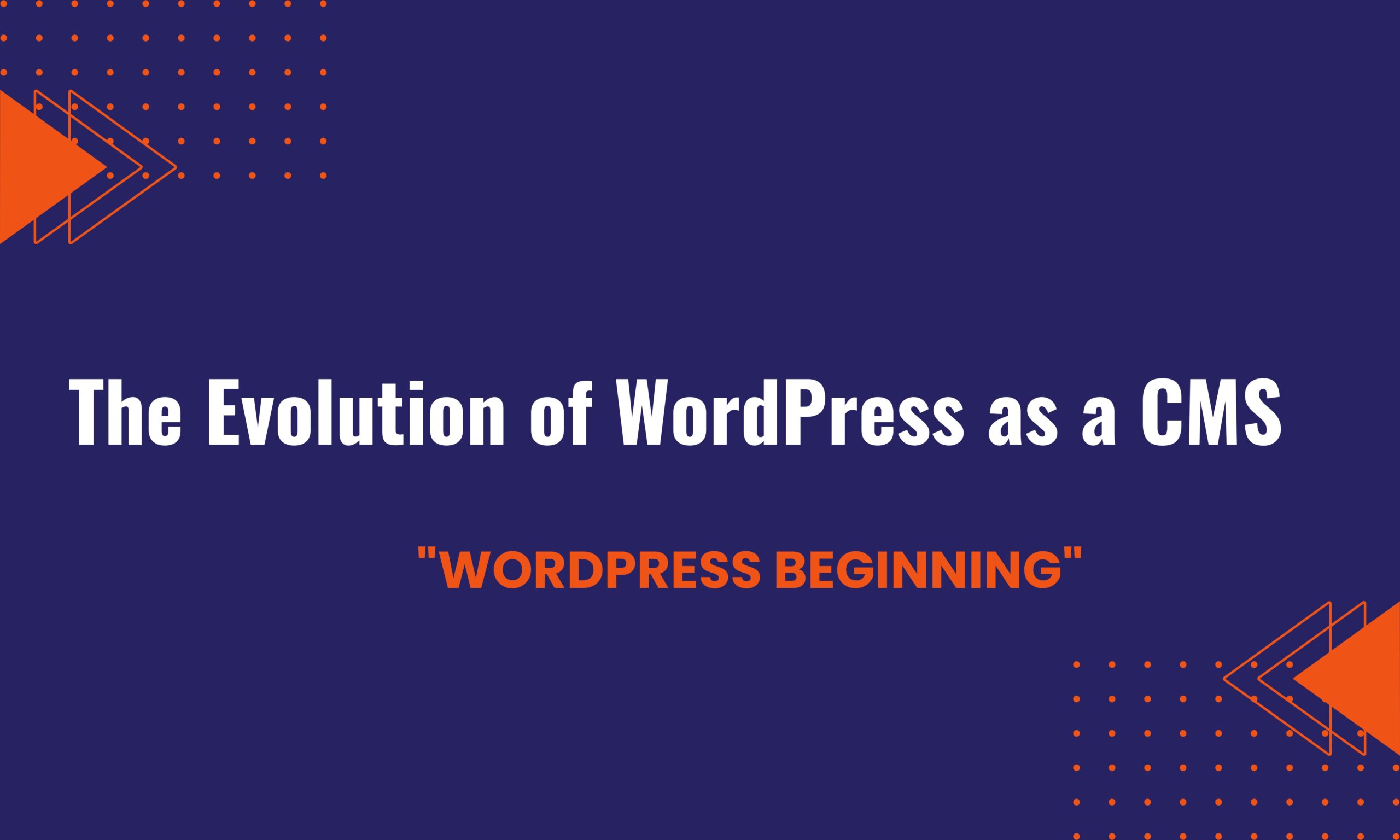As WordPress reaches its 20th birthday, it’s incredible to see how far this well-known content management system (CMS) has come from its modest origins.
WordPress will commemorate its 20th anniversary last year on May 27, 2023. When it comes to building amazing websites, a lot of us consistently use this content management system.
Although many solutions are accessible, WordPress stands out as a true champion, helping users of all levels to establish a gorgeous and powerful online presence.
WordPress was once created as a straightforward blogging platform, but it swiftly rose to the top of the CMS market and is currently utilized by more than 43% of all websites.
Concerning content management systems, WordPress likewise has a 64% market share. However, why?
What makes WordPress the top content management system? Why are services for WordPress development so well-liked?
That has several causes, all of which have attempted to go into depth. Let’s first define WordPress and CMS, though.
What is CMS?
A software program that enables users to create, edit, publish, manage, and alter information on a website without the need for specific technical skills is known as a content management system (CMS).
Put more simply, a content management system (CMS) is an essential tool that enables any business user to create a website without ever writing a word of code or even having any coding experience.
Businesses can use a content management system to handle all of their system requirements and basic infrastructure rather than developing their system for web page creation, image storage, and other basic publishing tasks.
This allows them to concentrate more on their websites’ front-end elements and content marketing strategy.
What is WordPress?
WordPress is also a content management system CMS that lets you modify an already-existing website or build a new one from the ground up.
The CMS is widely used worldwide, powering millions of websites and blogs.
WordPress offers an easy-to-use interface for managing and creating website content, eliminating the need for coding knowledge or hiring a web developer.
WordPress is incredibly flexible and always a wonderful place to start, whether you’re a business owner trying to develop a website for your firm or an individual wanting to start a blog.
The Top Benefits of Using WordPress CMS
Any kind of website may be made with WordPress, a strong and adaptable content management system. Among its numerous advantages are:
Simple User Interface
The WordPress UI is easy enough for beginners to pick up quickly, but it is also robust enough for seasoned professionals who require additional control over the design and organization of their websites.
Scalability and Flexibility
WordPress provides a great deal of design versatility, making it simple to create websites with highly personalized designs.
Additionally, it scales nicely for adding new features and functionality or when you require more resources as your site’s traffic increases.
Security & Accessibility
WordPress is one of the most secure content management systems available today because it was developed with security in mind from the beginning and is still being developed by thousands of volunteers.
Regular updates guarantee that vulnerabilities are patched as soon as they are discovered anywhere within the codebase.
All things considered, WordPress is a strong and adaptable CMS that is simple to use and understand.
It is a fantastic choice for companies and people of all sizes who wish to build a safe, manageable, and expert website.
Six Arguments for WordPress as a Top CMS Platform
None is as well-known as WordPress. Here’s how WordPress varies from other platforms:
Easy to Manage
The platform allows non-technical users to develop and distribute content, and the installation process takes no more than five minutes.
With some help from the community, you can simply monitor, install plugins, and access and edit your pages.
Numerous Extensions & Add-ons
With WordPress, there are a ton of fantastic free plugins and widgets that you can use.
Small-to medium-sized business sites and more complicated solutions requiring a great deal of technical development work benefit greatly from these add-ons. They support website customization.
Safety
With the proper security measures in place, such as updating the WordPress core and plugins, WordPress may be as safe as any other CMS.
Additionally, it ensures that the custom code is created by industry best practices and makes use of WordPress-managed hosting from a reliable provider with first-rate support.
Adaptability
Scaling your website is one of the key characteristics that defines what WordPress is. The development work is supported by over 59,471 plugins.
The amount of add-ons is astounding—possibly more than with any other CMS. Everything you require for a WordPress website is available.
If you are not capable of doing it on your own, a WordPress development specialist can.
SEO-Friendly
WordPress is good at applying search engine optimization best practices, but many of its competitors are unable to offer a straightforward SEO experience.
Using the power of high-quality content, keywords, and plugins, you may further examine and optimize your material.
Community Assistance
WordPress is a community-driven platform. 455 million websites have been built with WordPress, indicating a strong community and commitment to the advancement of open-source technology.
The Evolution of WordPress
WordPress (WP) began as a blogging platform in 2003. Because it was so accessible, it became more and more popular, giving rise to the millennial documentary genre.
It has developed into a fully featured website builder with adjustable themes and plugins over time.
When WordPress version 1.2 was published in May 2004, it came with the plugin architecture, which let developers and users create custom plugins to expand the capabilities of the platform.
In February 2005, WP 1.5 was released by English developer Mike Little and American entrepreneur Matt Mullenweg.
It featured a new theme system, Pages, comment moderation capabilities, and a new default theme.
Over time, WordPress has developed to include capabilities that facilitate the process of building websites.
Based on studies, WordPress runs 43% of all websites and has 65% of the market for content management systems for websites.
No matter how much experience you have with website creation, WordPress (WP) has transformed its website builder into a treasure trove of knowledge that everyone can discover.
This is one of the most fascinating things about WP.
Because of the team’s unwavering dedication to making website creation simple, developers from all over the world can contribute data to enhance WordPress features and guarantee user safety.
WordPress Types
The two primary WordPress websites are WordPress.org and WordPress.com, which offer completely distinct functionality and content.
WordPress.org
Frequently called a self-hosted WordPress website. You can establish a fully-owned website by downloading WP source code files from WordPress.org and hosting them on any hosting platform.
All you need is an uploaded source code file to your choice hosting platform, a hosting plan, and a domain name that you have acquired for your website.
WordPress.com
Even with its simplicity, WordPress.com is used for the profit of WordPress producers.
This means that any website hosted by WordPress.com is not fully owned by you. You’ll require a different payment plan to use this platform to host your website and keep your domain.
Furthermore, self-hosted WordPress loses its flexibility if you host your website on WordPress.com.
Conclusion
WordPress develops along with the advancement of technology. The platform is always adapting to accommodate its users’ ever-changing needs.
WordPress is making it even easier for users to develop and customize websites with the release of the Gutenberg editor and an emphasis on full-site editing.
As efforts are made to raise the accessibility requirements of the platform, WordPress is also becoming more accessible.
This guarantees that everybody can utilize and gain from WordPress, regardless of ability.
WordPress started as a simple blogging platform and has now developed into a robust content management system (CMS) that is used by millions of websites globally.
It is fascinating to follow as a platform because of its constant evolution and expansion, and we can only speculate about what the future holds for WordPress.

